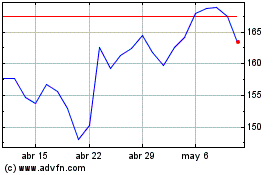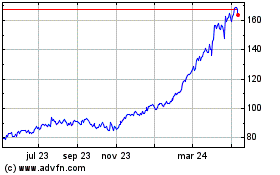By Nina Trentmann
Suppliers to Boeing Co. are struggling to navigate uncertainty
arising from the continued grounding of the company's 737 MAX
aircraft.
Reliant on Boeing orders, executives of the 600-plus companies
that supply more than three million parts to make the beleaguered
jet are bracing for potential changes to production levels should
the aircraft remain grounded beyond the summer.
Boeing in April reduced its monthly production rate of the jet
to 42, down from 52 before the second fatal crash of a 737 MAX in
five months on March 10 in Ethiopia.
Boeing last week said it would go through its list of suppliers
and components one by one and make adjustments if necessary. That
might make suppliers -- who provide parts from fan blades to
fuselages -- reconsider their risk-management strategies and growth
plans, given that Boeing before the crashes had indicated it could
boost monthly production to 57 planes later this year.
A production rate increase with short notice could be just as
disruptive as a cut. "It is not an easy supply chain to switch on
and off," said Douglas Groves, chief financial officer and
treasurer at Ducommun Inc., a Boeing supplier that makes wing
flaps, also called spoilers; floor panels; and pylons for the 737
MAX. "Once you turn it off, it takes a while to turn it back
on."
The companies have had discussions, but Ducommun hasn't received
formal purchase order changes, Mr. Groves said. Ducommun still
makes its components at a rate of 52 planes a month. The company
generates around $100 million a year from part sales for the 737
MAX.
The company's management discusses the 737 MAX situation every
day, Mr. Groves said. "We are doing a lot of scenario planning," he
said. "But it all depends on how long this is going on for."
Investigations into the causes of the two fatal crashes are
ongoing. For many suppliers, the core question is whether the
grounding of the aircraft will continue beyond the summer, said
Kenneth Herbert, an analyst at Canaccord Genuity LLC.
The Federal Aviation Administration grounded all 737 MAX jets on
March 13, three days after the Ethiopian Air accident.
"The million-dollar question is at what point will suppliers
decide to slow investments," Mr. Herbert said. CFOs at some Boeing
suppliers haven't adjusted their spending, but that could change,
depending on the outcome of the accident investigations, said Mr.
Herbert.
Honeywell International Inc., which makes mechanical systems and
avionics for the 737 MAX, said it is optimistic the plane will
resume service in the second half of the year. "Given that most --
just about everybody -- expects a resolution, we do too," Chief
Executive Darius Adamczyk said on a recent earnings call.
Honeywell has absorbed the production rate cut to 42 planes a
month, he said, adding that the impact on the company's finances is
negligible.
Safran SA, a French company that makes passenger seats, wheels
and fans for the 737 MAX, on Friday said it would adjust its
production if necessary. It expects a EUR200 million ($222.9
million) cash-flow impact if Boeing doesn't deliver any new 737 MAX
planes to its customers in the second quarter, Chief Financial
Officer Bernard-Pierre Jacques Delpit said during an earnings call.
The company declined to comment further.
CFM International, a joint venture between Safran and General
Electric Co. that makes the engine for the 737 MAX, said it doesn't
plan to cut production at this point. It has been coordinating with
Boeing, a spokesman said.
For Ducommun, a short-term cut in output would be challenging,
Mr. Groves said. The company places its orders for titanium, one of
the metals used in its components, more than 12 months in advance.
Instead, Ducommun could hold excess inventory, but that would come
at a cost to Boeing, Mr. Groves said.
Some suppliers already have bespoke arrangements with Boeing to
reduce their financial exposure to the grounding.
Spirit AeroSystems Holdings Inc., a maker of fuselages for the
737 MAX, will keep producing at a 52-plane-per-month rate and
receive payments from Boeing, even though excess fuselages will be
stored by Spirit, it said in a recent regulatory filing.
Given the complexity of its supply chain, Boeing needs to
discourage component makers from reducing production, said Cai von
Rumohr, an analyst at Cowen Inc. "You don't want a supplier to
anticipate a rate cut," the analyst said. Spirit declined to
comment.
Boeing is aware of the potential risks to its supply chain,
which can outweigh the cost of overstocking parts for a few months,
analysts say.
"When we do come back up and ramp, we're going to do it in a
very steady fashion with stability in each step along the way,"
Boeing CFO Greg Smith said during the company's first-quarter
earnings call last week. Boeing didn't immediately respond to a
request for additional comment.
Meanwhile, suppliers face the daunting task of trying to manage
the customer risk. Ducommun makes products for Airbus SE and
Gulfstream Aerospace Corp. as well as Boeing, and could expand its
business with those plane makers to mitigate the risk. "For us,
[the effort] is continuing to diversify our product portfolio," Mr.
Groves said.
Write to Nina Trentmann at Nina.Trentmann@wsj.com
(END) Dow Jones Newswires
April 29, 2019 16:33 ET (20:33 GMT)
Copyright (c) 2019 Dow Jones & Company, Inc.
GE Aerospace (NYSE:GE)
Gráfica de Acción Histórica
De Mar 2024 a Abr 2024

GE Aerospace (NYSE:GE)
Gráfica de Acción Histórica
De Abr 2023 a Abr 2024
